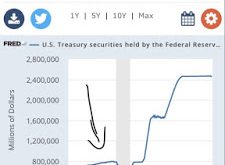The Swiss division of J.P. Morgan "seriously breached" anti-money laundering rules relating to the Malaysian sovereign wealth fund 1MDB, Switzerland's financial market regulator said Thursday. The agency, FINMA, said the Wall Street bank's local unit had "failed to adequately identify" increased money-laundering risks linked to the "allegedly corrupt" sovereign wealth fund at the center of a massive embezzlement scandal. FINMA said it concluded enforcement proceedings against J.P. Morgan...
Read More »McConnell back on bank reform
Looks like McConnell not getting caught up in all the tax cut hoopla and dropping the ball wrt bank reform; looks like he is on it:McConnell says he, President Trump and Speaker Ryan are meeting in the next few weeks to discuss what to do about entitlement reform in 2018.https://t.co/xWSN5gEAiR— Axios (@axios) December 22, 2017 Higher risk of a big negative development without it.
Read More »Fed lights the fuse
You can see here that as early as November 2007 the Fed created the initial credit contraction by quickly reducing the rate at which they were purchasing Treasury securities by $300B per some measure of time while keeping the total amount of system reserves constant: Quickly tossed the task of dealing that amount over to the depository institutions to then have to finance. This started the whole thing till eventually they shut the whole system of finance down by adding reserve assets at...
Read More »Peter Schiff says bitcoin is going to zero. That’s exactly why you should buy every dip.
Peter Schiff, the guy who has been so wrong about everything, is now saying that bitcoin is going to zero. This is why you should probably buy every single dip.Remember Schiff's predictions?QE will cause hyperinflation. The Chinese will stop "lending" to us and interest rates will skyrocket. Gold is going to $10,000.And more.Bitcoin is not a bubble. It's a symptom of the world's desire to "de-dollarize." And while it will not become any kind of mainstream currency anytime soon because of its...
Read More »Trump is the weakest president in American history.
Despite all his tough talk and bravado, Trump is the weakest president in American history. He has lamely, and in record time, become the most malleable puppet of the neocon, military/security state. He is the embodiment of what Eisenhower warned against. Even the meek and thin-skinned Obama wasn't this bad. Obama at least pushed back. sometimes. He had limits. Trump? A total puppet.
Read More »Zak Mir – Could the ‘Bitcoin Rush’ trigger the next financial crash?
At one stroke, there is a new asset class which is an easily divisible store of value. A decade since the "global financial crisis" in 2007, everyone from analysts to market commentators (to people who actually know what they're talking about) have been pondering what will end the quantitative easing (QE) fuelled rescue package? Apart from the moral hazard, the madness of ultra-low interest rates and the injustice of savers receiving next to nothing, it was always known that short-term...
Read More »Professor Sir Keith Burnett – Capitalism that works for everyone? Beware fake news
Policymakers must stop pretending they can fix broken markets with more and more regulation. Tory slogans are a gift to those who want to see everything nationalised. They had been ranting about wanting a capitalism ‘that works for all’, now it’s an economy that is ‘fit for the future’. What does that tell our young people about what we have now? It tells them that even the Tories are worried about seeing capitalism ‘red in tooth and claw’, particularly in our privatised public...
Read More »Jimmy Dore – Jill Stein: Newest Target Of McCarthyism
They are both good. The Real News Network have a very good interview with Jill Stein.Jimmy Dore - Jill Stein: Newest Target Of McCarthyism [embedded content] The Real News - Jill Stein Denounces Probe over 'Collusion with Russians' [embedded content]
Read More »Yanis Varoufakis – Debtors’ Prison, John Maynard Keynes & the Double Standards of the EU
[embedded content] In this video founder of the Democracy in Europe Movement 2025 and former finance minister of Greece, Yanis Varoufakis, talks about the concept of "Debtors' Prison" and the economic ideas of John Maynard Keynes. In addition Varoufakis surfaces the double standards of the European Union regarding the enforcement of economic rules amongst different member states.Nothing new here for seasoned economists, but I like the way Yanis Varoufakis put these points of view across....
Read More »The New Conservative: Christopher Whalen – Bitcoin: The Most Impressive Speculative Bubble In Modern History
The effusive praise for this cryptocurrency is nothing but self-generated flimflam. No messing here, Christopher Whalen, an investment banker, says Bitcoin is fraud. Stripped down to its basic elements, bitcoin is a classical fraud, a form of high-tech gaming that has captured the imagination of millions of greedy and gullible people around the globe. Participants exchange a legal tender dollar or some other real asset, for example, for a share of the limited supply of bitcoins at...
Read More » Mike Norman Economics
Mike Norman Economics


